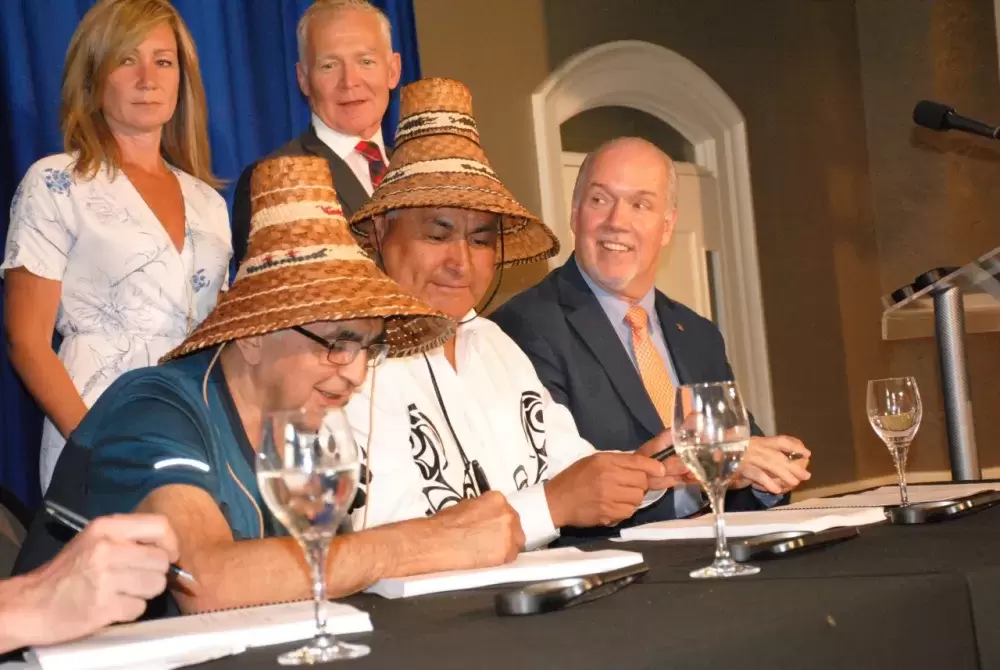Those engaged in treaty negotiations are looking to the new year with a renewed sense of hope, after 2019 marked major developments for several First Nations pushing for formal agreements that recognize their territorial rights.
Celeste Haldane, chief commissioner of the B.C. Treaty Commission, points to “political alignment” between British Columbia and the federal government. An announcement from Ottawa in late March that the federal government would be forgiving loans taken out to finance treaty negotiations has helped to bring multiple First Nations back to the table, she said.
“That’s changed things significantly, and so we’re seen seven tables representing 21 Indian Act bands this year alone moving to Stage 5,” commented Haldane.
The Ditidaht and Pacheedaht are the Nuu-chah-nulth nations among this group, as they signed an Agreement In Principle in late June with the feds and the province. The AIP entails the province build a 54-kilometre gravel service road from Lake Cowichan to Nitinaht Lake, capital transfers of almost $20 million and $40 million for the Pacheedaht and Ditidaht respectively, as well as treaty settlement land that includes portions of the West Coast Trail, which currently lies within Parks Canada’s jurisdiction.
Since the AIP was announced the Ditidaht have been hammering out an Engagement Framework Agreement, which stipulates how traditional territory outside of the treaty settlement land would be co-managed by the government and the First Nation. Ditidaht negotiator Robert Joseph foresees this tripling the First Nation’s influence over this territory, including forestry interests and water protection.
“We’re going to need to be able to say we would have control over a significant portion of our traditional territory,” he said, noting that he expects this agreement will develop until the treaty is finalized. “It’s going to be a negotiation right to the bitter end.”
Other side agreements are also in the works concerning federal and provincial parks. After the Trudeau Liberals were elected in 2015 Joseph has seen Parks Canada take more initiative to understand what meaningful management would mean for the Ditidaht. Part of the AIP is an agreement to preserve the most used sections of the Pacific Rim National Park reserve than run through Ditidaht territory along the coast.
“Parks Canada has been absolutely crucial to forwarding our agenda and our principles,” Joseph said. “They shocked me actually, the distance they came from five years ago to now.”
And after an unwillingness from the B.C. Liberals to co-manage provincial parks with the Ditidaht, Joseph has seen an willingness from negotiators working under the current NDP government.
“I think they have gotten way better,” he said.
Cheryl Casimer, political executive for the First Nations Summit, has also seen a complete shift in the provincial approach since the NDP-Green alliance took power in 2017.
“It’s like a breath of fresh air,” she said. “We have a government that’s a willing partner and has different views in terms of what recognition of Indigenous rights looks like.”
Along with the First Nations Summit and the federal government, the province signed the Recognition and Reconciliation of Rights Policy for Treaty Negotiations in September, which aims to give Indigenous groups more flexibility to incrementally develop agreements with governments.
“I think it’s cleared the path for nations that have been in the hold pattern for quite some time to be able to advance their negotiations,” said Casimer. “All of those major things that stopped people from participating, those obstacles are now removed.”
But the most newsworthy announcement from the province in 2019 concerning First Nations rights was legislation guided by the United Nations Declaration on the Rights of Indigenous Peoples. When it received royal assent in November, Bill-41 made B.C. the first province to adopt UNDRIP, following calls from the Truth and Reconciliation Commission.
Haldane expects that this act will advance reconciliation in B.C.
“We’re already seeing tables implementing the declaration directly into treaty negotiations,” she said, adding that this is the most progressive time she’s seen in the recognition of Indigenous rights. “You have governments willing to collaborate and co-develop policy, and co-develop mandates. I’ve never seen that before.”
But Joseph remains unconvinced Bill-41 will protect First Nations’ rights from the aims of politicians.
“There’s the word ‘may’ with regard to what the minister has to do,” he said. “That means that the minister is allowed to help us if he wants to, and that was always the case. So, what’s going to be different?”
“It’s going to be leverage,” continued Joseph. “But the reality is that Ditidaht has a way of not celebrating all of these big announcements the way everybody else does.”
Since a B.C.-specific treaty process was created in 1992, relatively few of the First Nations involved in negotiations have reached implementation of a formal agreement with the province and Ottawa. Those who have signed a modern-day treaty include five Nuu-chah-nulth nations, who began the Maa-nulth Final Agreement in 2011.







